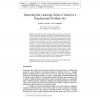Free Online Productivity Tools
i2Speak
i2Symbol
i2OCR
iTex2Img
iWeb2Print
iWeb2Shot
i2Type
iPdf2Split
iPdf2Merge
i2Bopomofo
i2Arabic
i2Style
i2Image
i2PDF
iLatex2Rtf
Sci2ools
125
click to vote
AIED
2009
Springer
2009
Springer
Detecting the Learning Value of Items In a Randomized Problem Set
Researchers that make tutoring systems would like to know which pieces of educational content are most effective at promoting learning among their students. Randomized controlled experiments are often used to determine which content produces more learning in an ITS. While these experiments are powerful they are often very costly to setup and run. The majority of data collected in many ITS systems consist of answers to a finite set of questions of a given skill often presented in a random sequence. We propose a Bayesian method to detect which questions produce the most learning in this random sequence of data. We confine our analysis to random sequences with four questions. A student simulation study was run to investigate the validity of the method and boundaries on what learning probability differences could be reliably detected with various numbers of users. Finally, real tutor data from random sequence problem sets was analyzed. Results of the simulation data analysis showed that th...
Related Content
| Added | 25 May 2010 |
| Updated | 25 May 2010 |
| Type | Conference |
| Year | 2009 |
| Where | AIED |
| Authors | Zachary A. Pardos, Neil T. Heffernan |
Comments (0)

